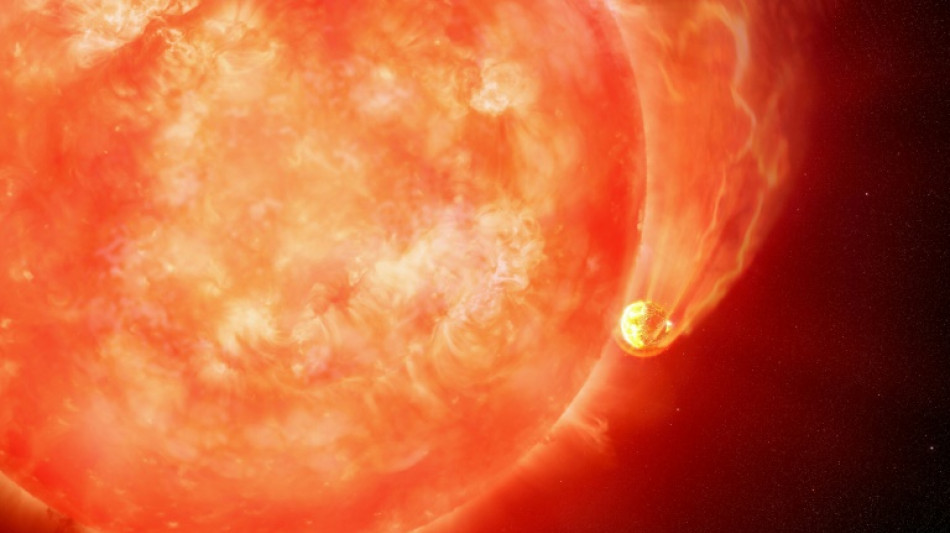
-
 Boeing strike will hurt Ethiopian Airlines growth: CEO
Boeing strike will hurt Ethiopian Airlines growth: CEO
-
Springboks skipper Kolisi wary of England's 'gifted' Smith

-
 End of a love affair: news media quit X over 'disinformation'
End of a love affair: news media quit X over 'disinformation'
-
US finalizes up to $6.6 bn funding for chip giant TSMC

-
 Scholz urges Ukraine talks in first call with Putin since 2022
Scholz urges Ukraine talks in first call with Putin since 2022
-
Zverev reaches ATP Finals last four, Alcaraz on brink of exit

-
 Lebanon rescuer picks up 'pieces' of father after Israel strike
Lebanon rescuer picks up 'pieces' of father after Israel strike
-
US retail sales lose steam in October after hurricanes

-
 Zverev reaches ATP Finals last four with set win against Alcaraz
Zverev reaches ATP Finals last four with set win against Alcaraz
-
Kerevi back for Australia against Wales, Suaalii on bench

-
 Spate of child poisoning deaths sparks S.Africa xenophobia
Spate of child poisoning deaths sparks S.Africa xenophobia
-
Comedian Conan O'Brien to host Oscars

-
 Rozner overtakes McIlroy and Hatton for Dubai lead
Rozner overtakes McIlroy and Hatton for Dubai lead
-
Mourners bid farewell to medic killed in east Ukraine

-
 Gore says 'absurd' to hold UN climate talks in petrostates
Gore says 'absurd' to hold UN climate talks in petrostates
-
Hamas says 'ready for ceasefire' as Israel presses Gaza campaign

-
 Amorim says Man Utd is 'where I'm supposed to be'
Amorim says Man Utd is 'where I'm supposed to be'
-
Japan hammer Indonesia to edge closer to World Cup spot

-
 Jeff Beck guitar collection to go under the hammer in January
Jeff Beck guitar collection to go under the hammer in January
-
Veteran Ranieri has 'no time for mistakes' on Roma return

-
 Van Nistelrooy says he will 'cherish' Man Utd memories in farewell message
Van Nistelrooy says he will 'cherish' Man Utd memories in farewell message
-
IAEA chief tours sensitive Iran nuclear plants

-
 Pompeii rejects 'mass tourism' with daily visitor limit
Pompeii rejects 'mass tourism' with daily visitor limit
-
Jailed Russian poet could be 'killed' in prison, warns wife

-
 French court orders release of Lebanese militant held since 1984
French court orders release of Lebanese militant held since 1984
-
Global stocks struggle after Fed signals slower rate cuts

-
 UK economy slows, hitting government growth plans
UK economy slows, hitting government growth plans
-
Primary schools empty as smog persists in Indian capital

-
 Palestinians turn to local soda in boycott of Israel-linked goods
Palestinians turn to local soda in boycott of Israel-linked goods
-
Typhoon Man-yi bears down on Philippines still reeling from Usagi

-
 UK growth slows in third quarter, dealing blow to Labour government
UK growth slows in third quarter, dealing blow to Labour government
-
Chris Wood hits quickfire double in NZ World Cup qualifying romp

-
 Markets struggle at end of tough week
Markets struggle at end of tough week
-
China tests building Moon base with lunar soil bricks

-
 Film's 'search for Palestine' takes centre stage at Cairo festival
Film's 'search for Palestine' takes centre stage at Cairo festival
-
Oil execs work COP29 as NGOs slam lobbyist presence

-
 Gore says climate progress 'won't slow much' because of Trump
Gore says climate progress 'won't slow much' because of Trump
-
'Megaquake' warning hits Japan's growth

-
 Stiff business: Berlin startup will freeze your corpse for monthly fee
Stiff business: Berlin startup will freeze your corpse for monthly fee
-
Wars, looming Trump reign set to dominate G20 summit

-
 Xi, Biden attend Asia-Pacific summit, prepare to meet
Xi, Biden attend Asia-Pacific summit, prepare to meet
-
Kyrgios to make competitive return at Brisbane next month after injuries

-
 Dominican Juan Luis Guerra triumphs at 25th annual Latin Grammys
Dominican Juan Luis Guerra triumphs at 25th annual Latin Grammys
-
Landslide win for Sri Lanka president's leftist coalition in snap polls

-
 Australian World Cup penalty hero Vine takes mental health break
Australian World Cup penalty hero Vine takes mental health break
-
As Philippines picks up from Usagi, a fresh storm bears down

-
 Tropical Storm Sara pounds Honduras with heavy rain
Tropical Storm Sara pounds Honduras with heavy rain
-
Pepi gives Pochettino win for USA in Jamaica

-
 'Hell to heaven' as China reignite World Cup hopes with late winner
'Hell to heaven' as China reignite World Cup hopes with late winner
-
Rebel attacks keep Indian-run Kashmir on the boil


Star swallows planet in first glimpse of Earth's likely end
Scientists said Wednesday that they have observed a dying star swallowing a planet for the first time, offering a preview of Earth's expected fate in around five billion years.
But when the Sun finally does engulf Earth, it will cause only a "tiny perturbation" compared to this cosmic explosion, the US astronomers said.
Most planets are believed to meet their end when their host star runs out of energy, turning into a red giant that massively expands, devouring anything unlucky enough to be in its path.
Astronomers had previously seen the before-and-after effects of this process, but had never before caught a planet in the act of being consumed.
Kishalay De, a postdoc researcher at MIT in the United States and the lead author of the new study, said the accidental discovery unfolded like a "detective story".
"It all started about three years ago when I was looking at data from the Zwicky Transient Facility survey, which takes images of the sky every night," De told an online press conference.
He stumbled across a star that had suddenly increased in brightness by more than 100 times over a 10-day period.
The star is in the Milky Way galaxy, around 12,000 light years from Earth near the Aquila constellation, which resembles an eagle.
- Ice in boiling water -
De had been searching for binary star systems, in which the larger star takes bites out of its companion, creating incredibly bright explosions called outbursts.
But data showed that this outburst was surrounded by cold gas, suggesting it was not a binary star system.
And NASA's infrared space telescope NEOWISE showed that dust had started to shoot out of the area months before the outburst.
More puzzling still was that the outburst produced around 1,000 times less energy than previously observed mergers between stars.
"You ask yourself: what is 1,000 less massive than a star?" De said.
The answer was close to home: Jupiter.
The team of researchers from MIT, Harvard and Caltech established that the swallowed planet was a gas giant with a similar mass to Jupiter, but was so close to its star that it completed an orbit in just one day.
The star, which is quite similar to the Sun, engulfed the planet over a period of around 100 days, starting off by nibbling at its edges, which ejected dust.
The bright explosion occurred in the final 10 days as the planet was totally destroyed when it plunged inside the star.
Miguel Montarges, an astronomer at the Paris Observatory who was not involved in the research, noted that the star was thousands of degrees hotter than the planet.
"It's like putting an ice cube into a boiling pot," he told AFP.
- Watching Earth's fate -
Morgan MacLeod, a postdoc at Harvard University and co-author of the study, published in the journal Nature, said that most of the thousands of planets discovered outside the Solar System so far "will eventually suffer this fate".
And in comparison, Earth will most likely end not with a bang but a whimper.
When the Sun expands past Mercury, Venus and Earth in an estimated five billion years, they will make "less dramatic disturbances" because rocky planets are so much smaller than gas giants, MacLeod said.
"In fact, they will be really minor perturbations to the power output of the Sun," he said.
But even before it gets swallowed, Earth will already be "quite inhospitable," because the dying Sun will have already evaporated all the planet's water, MacLeod added.
Ryan Lau, an astronomer and study co-author, said the discovery "speaks to the transience of our existence".
"After the billions of years that span the lifetime of our Solar System, our own end stages will likely conclude in a final flash that lasts only a few months," he said in a statement.
Now that astronomers know what to look for, they hope that soon they will be able to watch many more planets be consumed by their stars.
In the Milky Way alone, a planet could be engulfed once a year, De said.
A.Malone--AMWN


